#it's funny because I wanted more people to know about colonisation and my country's history
Note
Infodump about your countryhuman aus please.
AGHOASOFKFNG You don't know that you just triggered secrets buried deep in the archives and I will thank you for that anonymous.
Soooo it has been a while since I've made au particularly in the countryhumans fandom but the survivor one is one my fav and my biggest
Basically it's a post apocalyptic universe where everything crumbled to chaos including Neo Pangea (the fictional place where countryhumans and human born in the place lives). Though the huge problem erupted mainly in developed countries (don't ask why I just saw how much shits US, western European countries and others are going and I was like "man wouldn't it be funny to see their people go apeshit lol") therefore less known territories are left out of the mess but that doesn't mean they don't get involved. That's why I came up with Tuvalu, Palau and Madagascar as protagonists.
There's also this another AU which is about Austronesia.
Actually I've been hyperfixated on oceanian and African countries since I've discovered Countryhumans and this only got amplified when I realized that Madagascar was part of the Austronesian family (which includes a few southeast Asian countries and the Pacific. Even Taiwan is involved! I swear it's really interesting-) which led me to think like "mmh what if I made a story where Proto-Austronesia (Melanesian/Polynesian origins alongside with Formosan tribes from Taiwan) actually used to be a giant country before it dissolved during colonisation?"
Unfortunately I didn't wrote everything about it yet because there's just do much to unpack (also mainly because I want to put mythical features in there alongside with history)
It was also heavily inspired by this video
https://youtu.be/LlHPOojeOeo?si=S2NisDRshhWMKS0y
Then there's something that everyone has been using a lot but I wanted to put my part in it too : where colonial powers come back and claim "what they have lost". It's basically similar like the other stories you've seen on Wattpad just the difference is like always I would probably focus more on underrated countries (like Mozambique- I've also started to write about it since 2 years actually!)
And last but not least a fantasy au where countries would have folklore attributes and live in separate worlds (Yk something like Greece lives in Olympia, the Nordic countries in Valhalla, Madagascar in Ambodrobe ect). Don't have a specific plot idea for this yet but planning to!
Anyway I have others au but those are my main one and I'll probably do a separate post about it lol :')-
Either way I'm glad you asked and it was fun to write all of this💕
3 notes
·
View notes
Note
And it is not like spain doesn’t have their own history. Like imagine if they would have done a similar thing traveling to South America. Even if they don’t know about the history of New Zealand, which is understandable for a Spanish person, they should know general things about colonisation
They did it in a way they thought was funny and laughed about it. Like the other anon said, it wasn’t like they were genuinely trying to to something in a nice way but didn’t get it right
I'm posting this because that is another dimension to this worth mentioning: Spain's history with colonisation and causing harm to indigenous peoples. Personally, speaking as someone who's country has a painful past under Spanish rule, that was definitely my first thought, and how they should have taken care to inform themselves more because of their country's past.
That being said, I don't want to keep repeating the same point of "what they did was wrong" because I think most of us are agreed on that. People are already calling out the Spanish players and federation in other apps/websites, where those comments could actually be seen by the players/federation.
Like I said before, I am hoping that Spain and the other teams take this as an opportunity to educate themselves. That goes for us fans as well.
3 notes
·
View notes
Text
I hate the whole "All British people are ugly colonialist tea-drinking incestuous twats who adore the royal family" stereotype that Americans in particular perpetuate because... have they ever met a British person? Almost everyone I know is anti-royal, less than half of the people I know drink English tea, Queen Elizabeth is the ONLY person that I know of who's had an incestuous relationship, SO MANY PEOPLE actively hate colonialism, we actually learn the poem "Checking Out Me History" by John Agard as part of our English GCSE course because AQA want us to learn how colonialism affects people, and whilst I personally don't like my teeth or ears, I don't like any part of myself so I'm gonna consider myself an outlier and instead present the numerous British actors and actresses (such as Keira Knightley, Tom Holland and Tom Hiddleston) who are all very attractive.
ALSO the whole "all brits like colonialism" thing usually comes from more liberal people AND WHY ARE LIBERALS PERPETUATING STEREOTYPES DO YOU KNOW HOW STUPID THAT IS I hate colonialism I think that the colonialists were awful people and im glad everyone has independence but my family fled from Germany and Poland in world war two we weren't here when the British were colonising everything WHY AM I BEING BLAMED FOR THIS WHAT
And also WHAT FUCKING ACCENT DO PEOPLE THINK WE HAVE i speak like im living in a Jane Austen novel where did this "its chewsday innit" thing come from not even people living in Essex sound like that could you imagine if people started saying that a Boston accent was the same accent that all Americans have what the actual FUCK
I, too, find Prince Philips death kinda hilarious and im enjoying the memes BUT PLEASE stop stereotyping British people its not funny it makes you sound like a bit of a dick honestly and for the most part, its all just utter bullshit. Sorry to burst your bubbles but stereotypes are actually usually false (who would've thought?)
I don't care if you think you're "standing up to colonialism", you aren't, you're just perpetuating a stereotype that is just unnecessarily cruel. Yeah, there are some shitty Brits out there but GUESS WHAT there are shitty people in every. single. country so if you're going to post generalised statements about British people please just unfollow me, we don't tolerate stereotyping of any sort on this blog :)
10 notes
·
View notes
Photo
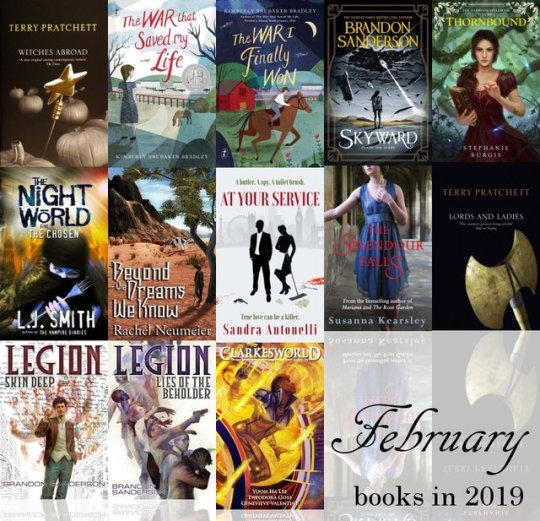
Books read in February
I don’t have a neat summing-up statement to make about what I read this month. But more than one of these stories set me wondering Does this qualify as a novella? and Does it matter whether or not it is?
My favourite cover is Thornbound.
Reread: Half of Snowspelled by Stephanie Burgis.
Still reading: The 100-Year-Old Man Who Climbed Out the Window and Disappeared by Jonas Jonasson and Dragonshadow by Elle Katharine White.
Next up: A Spark of White Fire by Sangu Mandanna.
(Longer reviews and ratings are on LibraryThing. And also Dreamwidth.)
Witches Aboard by Terry Pratchett (narrated by Nigel Planer): Although there were parts of Equal Rites and Wyrd Sisters that I really enjoyed, they are not my favourite Discworld of the novels and I was unenthusiastic about the witches travelling to foreign parts. Was that going to be funny or tedious? But this isn’t just about Granny Weatherwax, Nanny Ogg and Magrat going abroad, it’s about them taking on fairy-godmothering and it’s excellent. Exactly the sort of commentary on fairytales that I like.
Lords and Ladies by Terry Pratchett (narrated by Nigel Planer): “Lords and Ladies” is a euphemism for elves, for faerie-folk, who are threatening to cause problems in Lancre. I think there might be some A Midsummer Night's Dream references going on which I would have appreciated those more if I had more than vague idea about that particular play. But I was still entertained! The plot went in some unexpected directions, there are some young women who might become witches and Magrat versus the elves was a particular highlight.
The War that Saved My Life by Kimberly Brubaker Bradley: I love this book -- I’m getting emotional thinking about it! Because of Ada’s twisted foot, her mother doesn’t allow the ten year old to leave their one-room flat. But in 1939, Ada secretly teaches herself to walk and when her younger brother’s school is evacuated to the country, she leaves with him. Ada and Jamie are foisted upon a reluctant, grieving woman who owns a pony. Ada’s determined to teach herself to ride. The amount of things Ada doesn’t know, the extent of deprivation she’s experienced, is staggering, and recovery isn’t straightforward. But her journey is so heartwarming and hopeful.
The War I Finally Won by Kimberly Brubaker Bradley: I loved the sequel too. The war continues. Ada, Jamie and Susan wind up living with Lady Thorton, the mother of Ada’s friend Maggie, and Ruth, a Jewish teenager being tutored by Susan, whose mother is in an internment camp. Ada is frustrated that Lady Thorton doesn’t understand what her friends need, and is resistant to anyone mistaking Susan for her own mother. I liked the way the pieces of this story fitted together thematically: found-family and mothers, healing, and the things people need, and Ada learning what she can do for the people she loves. Moving. Made me tear up.
Skyward by Brandon Sanderson: A girl and her starship, on a planet where most people live safely underground and the stars are obscured by a layer of space junk. Not the first story I’ve encountered about a teenage underdog attending a special training school, overcoming obstacles and making friends, but it’s such a fun trope. This has lots of things I like: Teamwork! Flying! Mystery! An AI with personality! With satisfying twists and some oddly amusing characters.Some of training/fight sequences are too long and sometimes the narrative needed to show, rather than tell, Spensa’s emotions. But I still enjoyed it.
Thornbound by Stephanie Burgis: Sequel to Snowspelled. While Cassandra Harwood’s magical career has ended disastrously, she’s determined to keep challenging the idea that magic is the domain of men. But not everyone wants her college for young women to succeed. As staff and students arrive, Cassandra has to deal with thorny nightmares, an unfairly-overworked husband. a government inspection and a malicious fey disturbance. This is a story about challenging the status quo, and about the importance of having others -- family and community -- who can support you. Cassandra still struggles with feeling that she has to fight her battles alone. A delightful sequel. I loved this.
The Chosen by L.J. Smith: Not quite what I was looking for, in terms of reluctant soulmates, but it was fast-paced and entertaining. And it's ages since I've read any YA with vampires, so this was good for a bit of variety. Girl on a revenge mission makes some new friends.
Beyond the Dreams We Know by Rachel Neumeier: I loved this collection! Neumeier’s stories are vivid and atmospheric and hopeful. If anything else ties them, it is the place grief and loss have in most of the characters’ pasts and how the stories are then about those characters discovering something positive and new. The four novellas are sequels or prequels to Neumeier’s novels. My favourite was “Fire and Earth”, a coda to the Griffin Mage trilogy. So very satisfying! Of the shorter, standalone stories, my favourite was “Lila”, an urban fantasy about unexpected dragon hatchings, an artist living in her late-mother’s house and a fluffy dog.
At Your Service by Sandra Antonelli: About secrets, spies, scrambled eggs and defending one’s self with cleaning supplies. Mae works as a butler for Major Kitt, a retired army officer. When Mae is attacked and her late-husband’s mysterious trust fund disappears, she heads to Sicily for answers. I liked the mystery, the danger and the ratio of romance to plot. I liked Mae and Kitt’s relationship and appreciated the realistic way Mae processes life-threatening situations -- but I was uncomfortable with the violence. Fictional Espionage = Not (Always) For Me. I don't know if I liked this, but I want to know what happens in the sequel.
The Splendour Falls by Susanna Kearsley: Emily’s cousin, a history lecturer researching the Plantagenets, persuades her to join him for a holiday in France. I loved the atmosphere -- I loved the scenery and the tidbits of history and the growing sense of unease. There’s a medieval chateau, tunnels, a classical violinist, a tragic tale about lovers during WWII, the possibility of hidden treasure, a suspicious death, a stray cat, a child who likes to feed the ducks and quotations from Tennyson. This isn't a perfect book, but it was EXACTLY the sort of thing I wanted to read! (It’s even more Mary Stewart-ish than The Shadowy Horses.)
Legion: Skin Deep and Legion: Lies of the Beholder by Brandon Sanderson: Stephen Leeds lives with multiple hallucinations, stable personalities who only Stephen and his other hallucinations can see or hear. With Skin Deep I was more interested in the dynamic Stephen has with his so-called hallucinations than in the mystery they were trying to solve. They’re like imaginary friends -- except they’re more independent, not wholly imaginary. I found plot of Lies of the Beholder more engaging, but I’m undecided about whether the resolution was satisfying. It’s tidy in some ways and disappointing in others.
From Clarkesworld Magazine, issue 73, October 2012:
“A Bead of Jasper, Four Small Stones” (from Clarkesworld Magazine) by Genevieve Valentine (narrated by Kate Baker): A story about colonising Europa, haunting in that way Valentine’s often are. (Her stories have a quality which remind me of Vienna Teng’s songs.) I found the audio version harder to follow than the other Valentine stories I’ve listened to, perhaps because this one is punctuated by brackets and breaks, and those are harder for a narrator to capture.
“England Under the White Witch” by Theodora Goss (narrated by Kate Baker): Ann tells of her childhood, when the Empress came out of the north, and of her subsequent years in service. This is bleak but not hopeless. You have heard that there were once green fields, and rivers that ran between their banks, and a warm sun overhead. You have never seen them, and you believe they are merely tales. I am here to tell you that they are true, that in my childhood these existed. And cups of tea that were truly hot, and Christmas trees with candles on their branches, and church bells.
#Herenya reviews books#Brandon Sanderson#Stephanie Burgis#Rachel Neumeier#Susanna Kearsley#Terry Pratchett#Discworld#Kimberly Brubaker Bradley#Sandra Antonelli#Genevieve Valentine#Theodora Goss
2 notes
·
View notes
Text
Zombie Movie: Cargo (2018)
Oh my gosh I finally realised why this movie is called Cargo and I finished it twenty minutes ago.
Before I begin, I would like to acknowledge that I’m posting this from the land of the Dharawal (Tharawal) people, and acknowledge Elders past, present and emerging. I would also like to note that this post may contain names and/or images of deceased Aboriginal and Torres Strait Islander peoples.
I’m still crying after watching this so the first thing I will say is: please watch it.
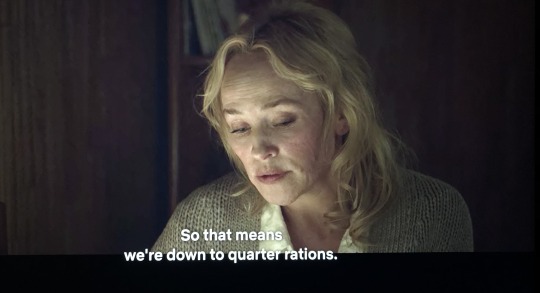
~~Rationing~~ (Picture: Andy’s wife Kay (Susie Porter) sitting in their house boat. Caption reads “So that means we’re down to quarter rations.”)
Cargo is a relatively chill zombie movie compared to movies like Train to Busan and I Am Legend, but because of this it’s able to take part so many other conversations - Aboriginal Land Rights and traditions, fracking, and for other zombie fans out there, new kinds of zombies!!
It is atmospheric, has tension in the right places, has an incredibly fresh plot, and is highly intelligent. Although, I do have to say, the lead of the Australian zombie movie is very British and that did make me laugh.
This is an Australian zombie movie, and as an Australian I’m very proud to say that. While most of the movie follows our lead, Andy (Martin Freeman), traversing rural Australia (this is set in South Australia btw, found a license plate), there is a huge focus on Aboriginal communities and traditions, and their connection with country and the land.
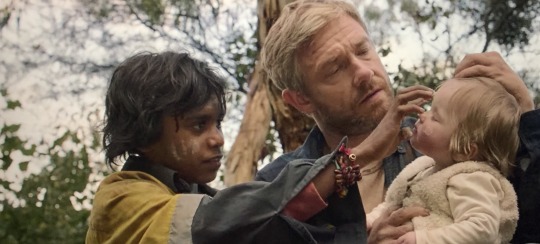
The sweetest frame in the whole film. (Picture: Andy holding his baby daughter Rosie, and gently brushing her hair aside while Thoomi (a young girl) applies a type of white paint to the baby’s face.)
So, this will be split into roughly three parts: zombies (because like I said, new zombies!! Very excited to talk about them!) before moving into the spoiler section with the plot and me roasting random things before ending up crying at the end, thinking I’d recovered from crying, then crying even more with the final shot. (I promise I’m okay this is a really good movie.)
Zombies!! Also small spoiler but the movie description kinda already spoils all of this so not really a spoiler??
Friends and enemies, want a fresh new take on zombies and the apocalypse? Cargo delivered.

Ahhh new zombies!!! (Picture: Kay zombie-fied. She has amber sap covering her eyes and her mouth. Her mouth looks a little like tree bark covered in sap. She’s in a car with her seatbelt on, and Andy has turned towards her. Andy has blood dripping down the side of his face and on his fingertips. In the background you can see the blue coat hanger of Rosie’s baby toy.)
We have a 48 hour incubation period for zombies, we have new symptoms for people before they become zombies, we have a new look including sap (I believe it’s sap) as well as burying your head in the sand - literally. Nothing’s explained, but I love speculating and trying to guess for myself. Oh, they also hibernate? But the rules surrounding that are a little hazy cause they’re still out and about during the day, and also Australia doesn’t really have mammals that hibernate mostly just insects so I’m not quite sure on the inspiration for that. But yeah, the sap and the head in the sand thing is like zombie video-game levels of creepy and cool.
Oh, also, unlike I Am Legend, we don’t have CGI zombies - we have special FX zombies!! Which is fantastic for anyone who wants to try and recreate the look and also makes it like 1000x more realistic.
I also love the implication that the Australian government will give us free kits to help when you get infected, cause like... they would. We have free Medicare and COVID testing - I could literally pop over to the local dental place and get a free COVID test. This is funny in comparison to traditional American (referring to USA) movies where they’re like zombie apocalypse three years later? Ha here’s a gun fend for yourself mate. There’s also no army presence in this movie either. As in, the only army we see are some zombies from the local army base. None of that “the army’s coming to save you trope” (if you would like to know how this movie has a happy ending without army intervention, it will be near the end of the spoiler section).
Also, these kits are so interesting. There’s a poster with the symptom list, a mouth guard, an epipen looking thing that’s uh... if you watch it you’ll see. AND!! My favourite part: the countdown fitbit.
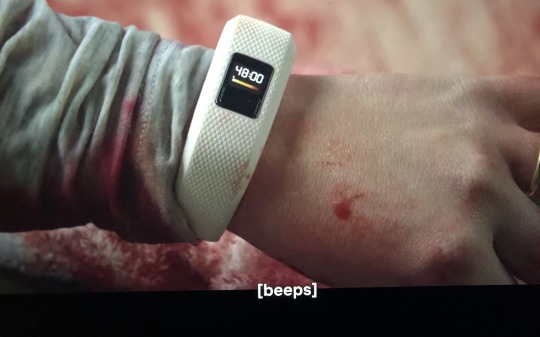
Zombie countdown fitbit! (Picture: A white watch-bracelet with a 48-hour countdown timer on it. It’s on a woman’s wrist. There’s blood on her sleeve, her hand, and a towel underneath her hand. You can see her simple wedding ring on her finger.)
In terms of the name for the zombies, I don’t recall anyone calling them “zombies,” and Thoomi (Simone Landers) calls them “ghosts.” Now, if you’ve read my hill to die on post, I basically have a thing about people making up arbitrary names for zombies because like it literally doesn’t make sense and they don’t do it with other supernatural things like vampires, but, Cargo gets an exception because it makes sense.
Okay, so, if you’ve learnt a little about Australian history, you’d know that Aboriginal people referred to the white colonisers as “ghosts” (for obvious reasons), ergo, it makes total sense for these zombies to also be called ghosts. They’re literally people without souls haunting the land. Therefore, the name “ghosts” isn’t arbitrary - it’s culturally significant and it makes sense.
Now, spoiler time for the plot!
The plot involves Andy traversing and meeting several people in order to try and find someone to look after his daughter. I won’t actually say too much more, I’m just going to do some pictures with some key takes to try and incentivise you to watch it.
The movie is rated MA15+, but I think that’s mostly just for the gore. There is a little violence towards the end but it’s mostly silhouetted so you don’t see anything.

The literal embodiment of “wanna go, mate?” (Picture: A dad wearing a flannel shirt and jeans is discreetly holding a gun he’s just pulled from the front of his jeans, showing it to the camera. Behind him is his wife and kids, who are having a birthday party. There are pink, yellow and green balloons.)
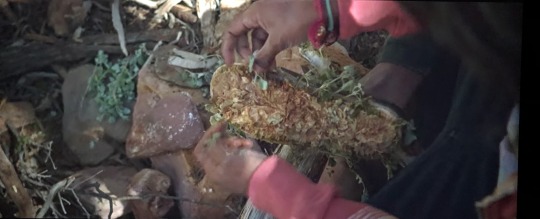
That’s so smart what the heck. (Picture: Thoomi is using tree sap to stick leaves to the soles of her shoes. Presumably it’s to be both quiet from the zombies, and to stop her leaving footprints that can be tracked.)


Hahahaha nope nope nope nope. (First picture: Below deck on a small yacht. There’s wooden panels that presumably make up a wall, with a fire extinguisher next to it. Andy is off to the side in the foreground, looking down at what he’s doing. Second picture: There’s a small gap as the wooden panels open up. It is not in fact a wall, but a door. Andy suddenly looks up at the sound.)
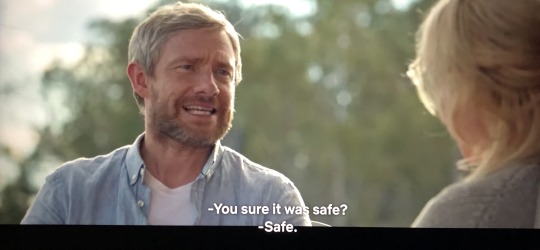
But are you sure sure, tho? (Picture: Andy talking to Kay after being on the yacht in the aforementioned pictures. Kay asks, “You sure it was safe?” and Andy assures her, “Safe.” Sir, did you not see the wooden panels open?)

That is not baby safe! It’s a coat hanger with fishing lines! It’s the exact opposite of a baby safe toy! (Picture: There’s a crashed car in the background. Andy is standing to the side, only his hand and the top part of his leg are in frame. His hand is covered in blood. The camera is focused on baby Rosie, who’s wearing a bucket hat and is sitting in her little baby-carrying backpack that Andy wears to carry her around. Rosie is sucking on a baby toy made of a bent, blue coat hanger, decorated with fishing lines and plastic fish baits.)
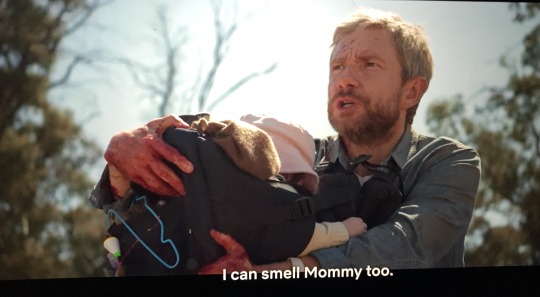
Sad noises :’( Also, why is Mommy spelt like that this is an Aussie film, it should be “Mummy.” (Picture: Andy holding Rosie in her baby-carrying backpack. The caption says, “I can smell Mommy too.” Mummy is spelt the American way for some reason.)
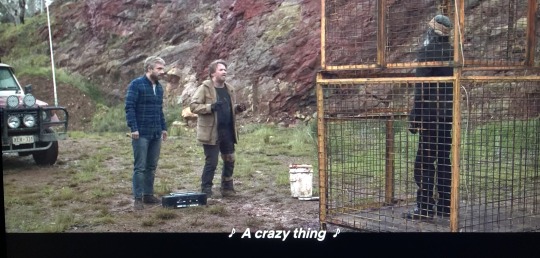
Racist prick (the guy in the middle). (Picture: Andy and Vic (Anthony Hayes), a random stranger he just found, are standing in front of a cage. From left to right, Vic’s car is in the background. Andy is standing next to a radio playing a song - the caption reads the song lyrics as “A crazy thing.” Vic is dancing along next to him. A white bucket full of blood is next to Vic. Inside the cage is the Clever Man (David Gulpilil). Vic has trapped him to use as zombie bait.)
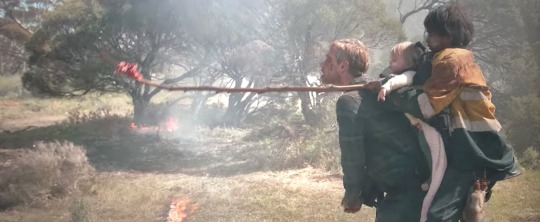
It’s like a carrot on a stick for a minecraft pig!! 10/10 smarts. (Picture: Thoomi and Rosie ride on a zombie-fied Andy’s back. Thoomi holds out a stick with some meat on the end to steer Andy. Andy’s hands are bound and he has a mouthguard in.)
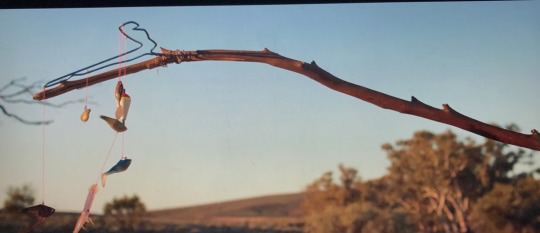
I take back everything I said about this baby toy. (Picture: Rosie’s baby toy tied onto a branch. A beautiful blue sky is in the background.)
Final things to say, I really liked Etta and Lorraine. Lorraine really got screwed over.
There are mentions to fracking poisoning the land, and I know I’m going to go to my own research on it. I won’t talk about it here because I’m just looking at the movie and I’m also not qualified to discuss the issue.
Also the ending is brilliant. The local Aboriginal peoples having their land and traditions and community and I know I’m not doing it any justice, but Cargo is a very considered Australian zombie movie, with Aboriginal peoples being very included. I apologise for not being able to phrase that better - just go watch it.
Lastly, I was doing some quick research to find out if any Aboriginal people directed Cargo or worked on the screenplay - I haven’t found anything yet, but I did find that this was adapted from the directors’ short film by the same name, so I’m off to watch that now.
Have a great night/day/morning/afternoon, and seriously go watch Cargo! (In Australia it’s on Netflix if that helps!)
0 notes
Text
(ESSAY) Thinking With Vahni Capildeo’s ‘Odyssey Calling’, by Azad Ashim Sharma
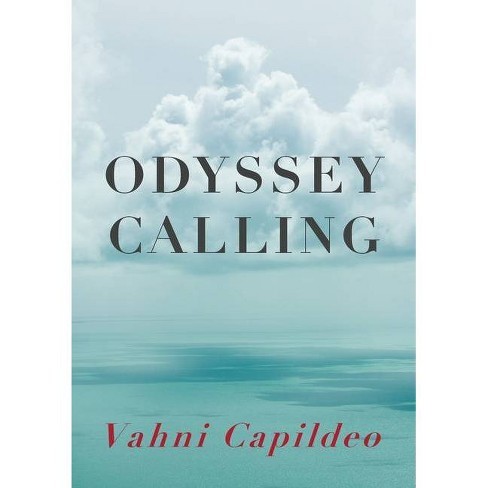
In this essay, Azad Ashim Sharma voyages the fraught expanse of colonial legacy, migration and racism explored in Vahni Capildeo’s stunning new pamphlet from Sad Press, Odyssey Calling (2020). Addressing the poems through close reading and reference to critical histories and cultural expression, from Windrush to Greek myth to Stormzy, Sharma shows how Capildeo’s work, while plugged into the reverberations of historical traumas and harms, also feels into the base/bassline of a possible future, building a living intensity through and against post-Brexit Britain.
> I recently attended a conference at the Institute of Contemporary Art in London called ‘Thinking Art’ which closed with a performance-lecture by Ayesha Hameed. Hameed took the audience through videos and lyrical thoughts to Barbados and her research into the Plantationocene – a theory that looks at Climate Change from the perspective of the slave-plantation. In the questions after, Hameed discussed how electronic music had added another dimension to this long project, and described how the baseline pulled at her organs and connected her with the ground, with the roots, with history. The last words of Vahni Capildeo’s recent Chapbook Odyssey Calling (Sad Press, 2020) are: indigo blue baseline (p.34). Since its publication Odyssey Calling has pulled at my organs. In what follows I want to think with the energy and spirit of this new collection, to feel the pull of its baseline, and understand what rhythms of contemporary life Capildeo attends do.
> Capildeo’s collection of poems and musings on some of their recent creative experiments captures a moment in our fraught times that warrants witnessing, demands listening, attends to the contemporary expressions of racism whilst conjuring a ‘humming brain-cave [that] you can step into’ (OC, p.2). This pamphlet offers itself to its reader as ‘a magic gift’ which ‘create[s] active silence[s]’ from which one can contemplate a true experience of our moment (Ibid). This humming or active silence is exactly what the baseline is, a low rumble, the sound of the sub, the undercommons, a play on ‘white noise’ as ‘Azure Noise’ (p.3). It’s a sound that laps at the body bringing it into grounding and into a liquiform murmur. Azure noise is the sound that Lewis Gordon has in mind when he reflects on ‘our willingness to become ancestors’ and ‘join a stream of accountability through descendants’ (Melancholia Africana Foreword, p. xi). It is the sound of gratitude as much as it is our riotous cry against the erasure of our history. That azure-noise is the sound of this ‘brain-cave’ implies an echo, a reverberation, an openness and willingness to hear and to summon the spirits, of those who have passed on, those who have been killed before their time, and those to whom we are responsible.
> What I mean precisely by this moment is what has been described by Maya Goodfellow as a ‘hostile environment’ in which the lives of those of migrant descent and newly arrived migrants are made unbearable, untenable, unliveable. As a direct consequence of the 2014 and 2019 Immigration Acts, what we are now witnessing in the UK from the deportation of Windrush citizens and the still on-going search for justice for Grenfell, the absurdities of Prevent, is a space in which people of colour are being left to destitution. We are those people called funny tinge, cockroach, burden, the swarm of supposed illegality that is threatening the economy. What is missed from all of this right-wing brouhaha is, of course, history. A history that is being obfuscated by the charlatans in Westminster who – aside from a minority of MPs – are in cahoots with these violent Acts and the legalisation of state enforced racist policy. It is an environment in which performances by Black British artists such as Stormzy and Dave are described as ‘racist’ for pointing out the very real concerns, experiences, and frustrations of communities who are essentially criminalised by the Tory Regime.
> What is so ‘scandalous’ about what has happened to the Windrush generation (if scandal is the right word for the deportation and death of citizens), is their misrecognition as other than citizens in the first place. This confusion between the various labels of immigrant, migrant, citizen, refugee, etc, appear in the poem ‘Odyssey Response’:
Sometimes, words, you launch in many lovely languages: yet,
before you begin to fly, you are misrecognized,
like an owl entering a superstitious person’s
open-plan room being beaten to death, Athena’s
wise bird struck down, bloody feathers everywhere,
a soft body a futile piñata
releasing clouds. (p.7)
The link between migration and birds is a common theme to this pamphlet’s thrust into the heart of the contemporary moment. But before the bird (migrant) is able to fly, misrecognition as a pest or an unwarranted guest leads to its demise: beaten to death, in someone else’s room. Capildeo’s use of the word ‘superstitious’ to describe the person doing this beating is marvellous. It precisely calls to the fore the grandiose whimsy of English nationalism, the sheer fiction it relies upon, the myth of its superiority and uniqueness. Furthermore the image of the piñata made me think of the right-wingers in this country like blindfolded children, striking at an imagined enemy, in the hope of sugary reward. Of course the bloody reality in this scene releases the opposite, the stark death of the ‘wise bird’. If the owl here represents the citizen-as-migrant, the wisdom this person contains is only released by their death, as if something as final as death was required to attend to the life and history of the journey that was over before it began. Bifo’s work on Breathing defines poetry as a metaphor for the ways in which we can escape the suffocation (of language and of our own capacity to breathe) by a landscape that has been invaded by nationalism, racism, and religious fundamentalism (p.9-10 Breathing Bifo). The accented slippery assonance of ‘superstititious’ is, to my mind, exactly what Bifo has in mind when he refers to poetry’s ‘excess of semiotic exchange’ that ‘can reactivate breathing’. It is the ‘breathiest’ moment in this saga of the wise bird’s demise, a hissing-lampooning of the fundamentalisms of post-Brexit Britain and its racist policy.
> And this brings me to something I think is curious in Capildeo’s poems, their evocation of a specific history. In the poem ‘Windrush Reflections’ we encounter history as a narrative, a narrative that contains the kernels of truth that are not taught in schools in the UK, namely the history of why the Windrush generation should never have been ‘sent back’. Capildeo delves into the heart of the matter:
…post-war Britain already was home
by birthright: documentation
was not a prize or a promise
for this generation born under
the far-fetched Union Jack (p.16-17)
This argument is familiar to those of us who have read and know our history. The experience of migration for many formerly colonised peoples was one of welcome in a Britain that was rebuilding after the devastation of WW2, a time when there was no need for ‘documentation’ because it was guaranteed by our status as ‘members of the Commonwealth’. The argument here, presented with increasing force through line breaks speaks truth to power; it is ‘birthright’ in the sense of the right to be born and to live, the right to thrive and have one’s rights respected, that are absolutely called into question by the hostile environment in today’s UK. To recall this history is to assert the right for Rights, of recognition, of representation, and of equality. It is against the hostility of the Union Jack that Capildeo writes, with a willingness to educate as well as to critique. It’s a stylistic mark of a lot of cultural production in the UK today from the music of Lowkey and Akala to Capildeo’s work which seeks to encourage a transformation of consciousness through the reactivation of anti-racist politics. Such work always bears the marks of history, and more often than not, is positioned on the right side of history.
> I also want to turn back to the poem ‘Odyssey Response’ as I think one of the great achievements of this collection of poems is its reimagining of the relationship between the histories of colonialism and migration that define a contemporary creolised UK and the old ‘classical’ relationship between poetry, myth, and epic. What Capildeo achieves by addressing the Odyssey as well as Windrush simultaneously is a Spivakian sense of the ‘ab-use’ or ‘use from below’ of the Enlightenment. Capildeo recasts the images of the Odyssey as that of Windrush, caught between the Scylla of Priti Patel and the Charybdis of social erasure. By recasting the migrant -both living and (socially) dead- as an Odyssean figure, a Spirit and Time traveller, Capildeo makes the request of them ‘if you see Columbus, shoot on sight’. This bullet that travels through spirit and time abuses the relationship with the epic, the odyssey is now the story of migration and not a classical text held above the historical experiences of Windrush as a kind of cultural prison. This conceptualisation of Odysseus in the plural moves against ‘the song of yourself simplified on the news’ (p.12) and delineates a space (or sound-space) where ‘words, take wing’ and ‘fly commonly among all people / who share vulnerability on a trembling earth’ (p.7). This abuse of the Odyssey raises our attention to ‘the uneven diachrony of global contemporaneity’ and is a supply, empowering gesture marking another fine addition to Capildeo’s important oeuvre.
> Where politics is revealing its true fascist face, poetry and by extension contemporary Grime and UK Rap are leading the way as a force for change, for consciousness, and for a deeper connection with histories both of colonisation and of the present. The most overt display of this has been Roger Robinson winning the T. S. Eliot prize for a collection of verse that engages in this precise moment we find ourselves in. Around the time of that announcement, the global poetry community collectively grieved for Kamau Brathwaite who, we learned, had joined the ancestors. In Brathwaite’s Middle Passages, which I re-read as soon as I heard of his passing, I encountered the lines ‘There was a land not long/ago where it was other-/wise” (p.88). That land may be the future we are working collectively towards, poetically and educationally through poetry, which I think captures something of the essence of what I am thinking with when I think with Odyssey Calling. In revealing and accessing that land, we return to the future.
Odyssey Calling is out now and available to order via Sad Press.
~
Text: Azad Ashim Sharma
Publsihed:
#poetry#poem#essay#essays#poetry essays#Vahni Capildeo#migration#Odyssey Calling#the Odyssey#Sad Press#Azad Ashim Sharma
0 notes
Text
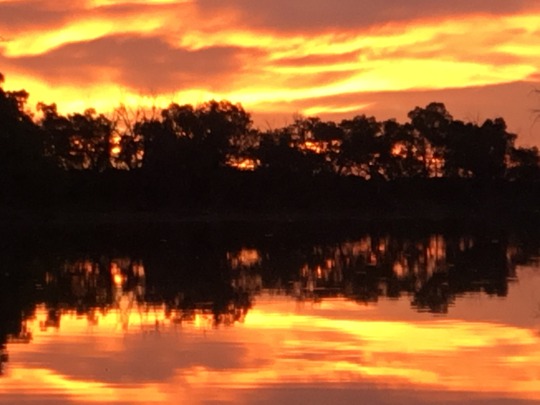
Love Unedited
Dear World,
I am writing to you from Australia. We are so blessed here. Gorgeous landscape, unique animals, wise indigenous heritage, courageous survivor spirt in all. The indigenous survivors of the terrible onslaught of a very different culture, those who come from another land in chains, those who chose this land as home as a better place for their families, as utopian dreamers. Although a magnificent beauty in some place this land can be very harsh and one must be resilient in many ways. So for that I am grateful that we are all survivors here and able to find even better ways to live together with shared respect for this great continent.
One thing it is easy to learn here you need a community to survive. You cannot do it all alone. You cannot just fortify yourself and get out your shotguns when any one else comes near looking for resources because they may be the very person you need to survive the next day. This was always apparent to indigenous mobs. Their main technology was sharing. Even on a river where more than one tribe bordered the river, fish traps were allowed for everyone. You left enough fish even for your traditional enemies. You did not impose on their right to live how they wished to live. You did not break their laws or you knew there would be consequences.
Today is a funny day for Australians. We have been calling it Australia Day, the day when Cook put up the flag for Queen and country and began the battle for possession of what was widely believed as terra nulliuss. For a few decades the mainstream white culture has come together beyond their own differences and had a game of cricket with family and friends to celebrate their community on this day. It wasn't about the nation or a political ideology, it was about being with people you loved and shared with and cared for and celebrating the opportunities we have because we live in relative freedom because of the resources of this beautiful land.
For indigenous Australians it has been a different story. To try and celebrate all that is good and the diversity of our multiple thriving cultures on this day is an affront to our shared history of colonisation, dispossession and attempted genocide. Indigenous Australians and their friends and family cannot celebrate it in its current form, it would be an insult for all their ancestors who fought in the frontier wars that have never been acknowledged, for all the women and children in their families who have been controlled, incarcerated and slaughtered while going about their own lives in their own way. Their culture is a generous culture, they had minimum impact on the land and had complex laws to live in interconnected balance with the environment and other species.
Things have become very complicated now for all of us with so many agendas playing out. One thing I do know, No human wants to live their life as a victim. Whether white or black, rich or poor, at some point once the wolf is no longer knocking at your door and survival is no longer your main concern, your self worth is not blown around in the wind, you find away to love yourself warts and all: We all begin to stand in our power and demand equity and to be seen as a survivor. Not blaming others for our own unwillingness to live by values and have the courage to do what it takes to live the life we actually want. Not backing down from the confrontations that are needed to gain understanding and the changes that will bring fairness. We decide that we will clean up our own backyard, address the ways that aren't working for the greater good of the whole and we learn to be of powerful service to our community. It is also the time we realise that this global community is interdependent on each other and what is playing out at the macro, in our global and community politics, is also playing out in our families and most intimate connections.
We realise that we must act within our own sphere of influence. ‘Over time this sphere of influence grows and the culture at large is determined.
What will you do today to stand strong and powerful with respect and dignity for the culture you believe in? Can you connect with another person and make the case for coming together with you sharing your resources, caring for each others needs and understanding and sharing your perspective? Can you do that with anyone who comes in your path. Better still can you just be with them with understanding, share your resources, care for them?
Can you be an inspiration to bring us all together in respect for the human rights of each individual and also each species and environment? Very soon, when we look back on our squabbles about who has what resources we will not even recognise the arguments. Because we will be living in a paradigm where all life has as much rights as we believe we have as individuals right now. We will live in a dreamtime where humanity and other species understand just how much we need the water flowing, the earth being replenished by growing things and we need each others respect for our lineage and journey's. Only then will we begin to honour and restore the diversity of life that is needed for a healthy place.
From "The Poet" Louise Moriarty going from the abundance of the city where all the resources have been taken to
back to the drained and devastated drought stricken interior that has been boiling at over 42 to 47 degrees since before xmas. The kangaroos are dying and the fish boiling, people are distressed and scared and trying to hold onto hope. Have an interest in other peoples worlds sometimes your neighbours is very different to yours.
Love to you all
PS If you need a poem please contact me it is my favourite gift to uplift with emotional sincerity and all the idiosyncrasies of a human living with passion and devotion to the heart of the planet.
Happy travels to you all #Make creativity viral
0 notes